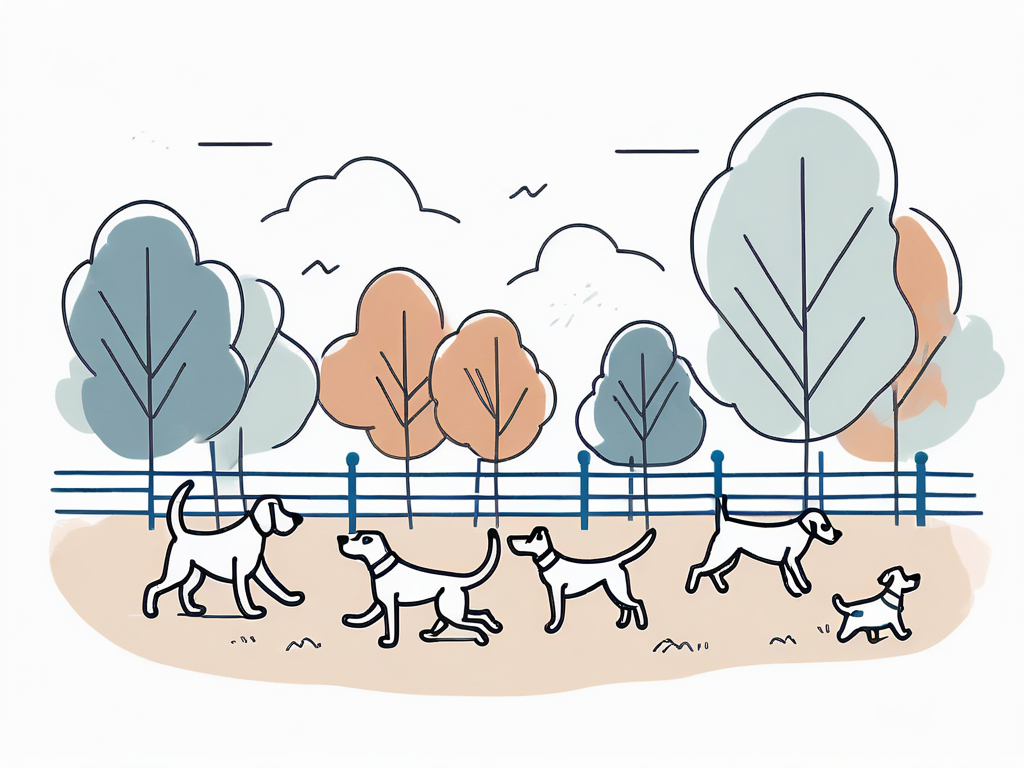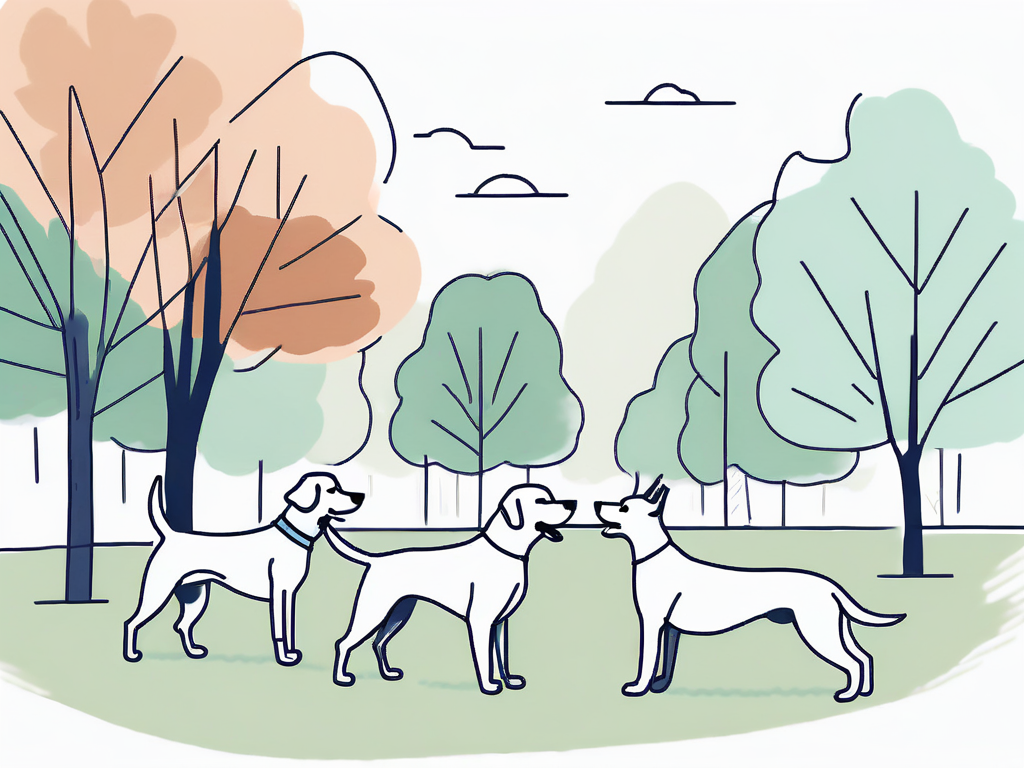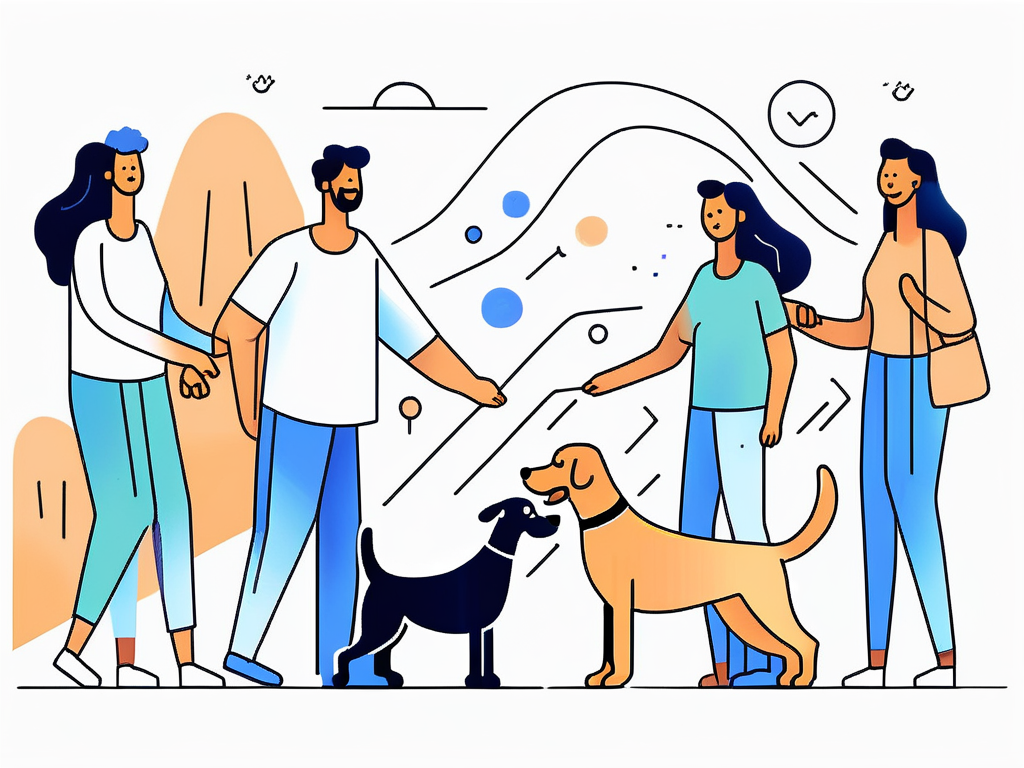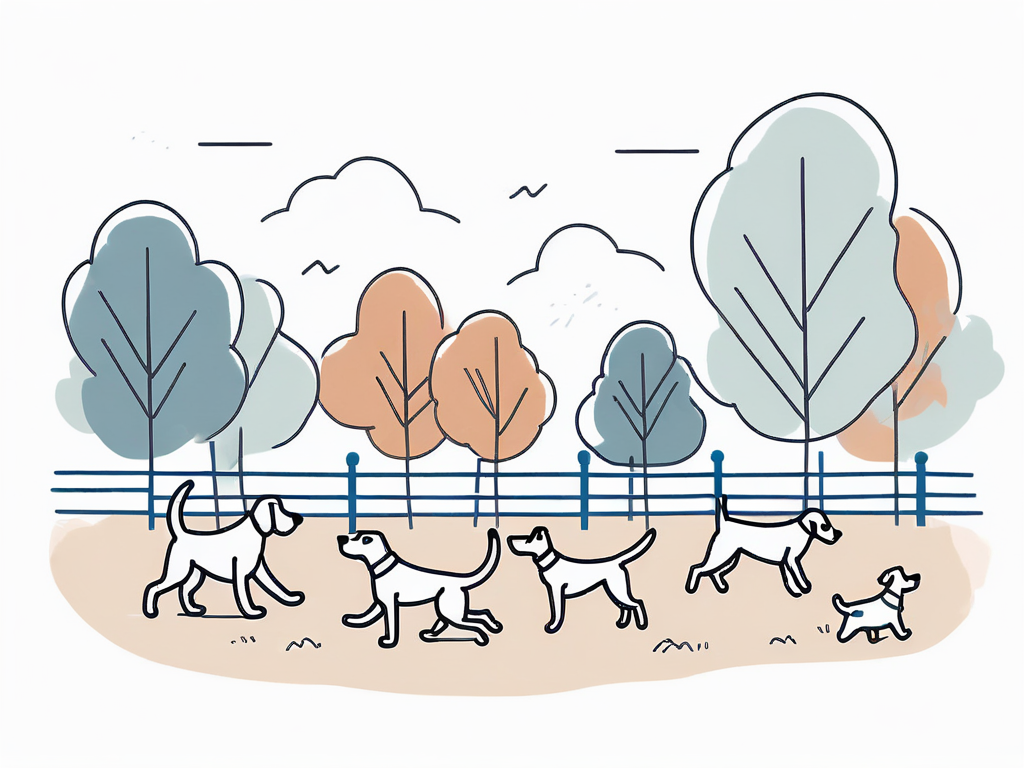How to Socialize Your Dog with Humans
Dogs are social creatures, and just like humans, they need interaction and companionship to thrive. Socializing your dog with humans is not only important for their overall well-being, but it also helps create a well-rounded and confident pet. In this article, we will explore the benefits of socialization, the risks associated with poor socialization, and how you can prepare your furry friend for human interaction.
Understanding the Importance of Socializing Your Dog
Dog socialization is the process of introducing and familiarizing your pup with various people, environments, and situations. It helps them develop the necessary skills to navigate the world with ease and confidence. Socialized dogs are generally more outgoing, less anxious, and better at handling new experiences.

But what exactly are the benefits of having a well-socialized dog? Let's take a closer look.
The Benefits of a Well-Socialized Dog
A well-socialized dog is like a social butterfly - they can comfortably interact with humans of all ages and backgrounds. Whether it's a friendly child wanting to pet them or an elderly person looking for some canine companionship, a well-socialized dog knows how to adapt to different individuals and make everyone feel at ease.
Not only are well-socialized dogs more comfortable around people, but they are also more relaxed and adaptable in different environments. Whether you're taking them to a bustling city street or a quiet countryside retreat, a well-socialized dog will be able to handle the change in scenery without feeling overwhelmed or anxious.
Furthermore, socialized dogs are less likely to develop behavior issues such as fearfulness, aggression, or excessive barking. By exposing them to a variety of situations and stimuli, you are helping them build confidence and learn how to appropriately respond to different stimuli. This can greatly reduce the chances of your dog becoming reactive or exhibiting problematic behaviors.
But it doesn't stop there. Socializing your dog also opens up a world of opportunities for them to experience new sights, sounds, and smells. Imagine taking your furry friend to a bustling dog park, where they can romp and play with other dogs, or to a pet-friendly cafe, where they can bask in the attention of adoring strangers. These experiences not only enrich their lives but also strengthen the bond between you and your four-legged companion.
Risks Associated with Poor Socialization
On the flip side, dogs that are not properly socialized may struggle with fear, anxiety, and aggression when exposed to new people or situations. Imagine taking your unsocialized dog for a walk and having them react anxiously or aggressively towards every passerby. This can make routine activities a stressful ordeal for both you and your pup, and can even put others at risk.
Poorly socialized dogs may also have difficulty adjusting to changes, such as moving to a new house or welcoming a new family member. Without the necessary social skills, they may become overwhelmed and exhibit behavioral problems. This can strain relationships and make it challenging to provide them with the care and support they need.
Given these risks, it is crucial to invest time and effort in socializing your dog from an early age. By gradually introducing them to different people, environments, and situations, you are setting them up for a lifetime of confidence, adaptability, and positive interactions.
Recognizing Your Dog's Socialization Stage
Every dog goes through different stages of socialization, and understanding these stages can help you tailor your approach to their specific needs.

Socialization plays a crucial role in shaping a dog's behavior and temperament, influencing how they interact with the world around them. It is not just about getting along with other dogs; it also involves how they respond to various stimuli, such as loud noises, unfamiliar objects, and different environments.
Puppy Socialization Period
The puppy socialization period, usually between 3 to 14 weeks of age, is a critical time for exposing your pup to various experiences. During this stage, puppies are like sponges, soaking up information about their environment and forming associations. Introduce them to different types of people, such as children, adults, and elderly individuals, to ensure they grow up comfortable with diverse human interactions.
Additionally, exposing puppies to different animals, surfaces, sounds, and environments can help prevent fear and anxiety-related behaviors in the future. Positive experiences during this period can lay a foundation for a well-adjusted and confident adult dog.
Adult Dog Socialization
If you missed the puppy socialization window, don't worry! Adult dogs can still benefit from socialization efforts. However, it may take a bit more patience and time, as they have already formed some habits and preferences. Focus on gradually exposing them to new people in positive and controlled environments.
Remember that socialization is an ongoing process throughout a dog's life. Regular exposure to different situations and stimuli can help prevent behavioral issues and ensure that your furry companion remains adaptable and friendly in various circumstances.
Preparing Your Dog for Human Interaction
Before diving into socializing your dog with humans, it's important to lay the groundwork for success by building trust and establishing basic training skills.
When it comes to preparing your dog for human interaction, it's essential to consider their individual personality and temperament. Just like humans, dogs have unique preferences and comfort levels when it comes to socializing. Some dogs may be naturally outgoing and eager to meet new people, while others may be more reserved or shy. Understanding your dog's personality can help you tailor your approach to socialization and ensure a positive experience for both your furry friend and the humans they encounter.
Building Trust with Your Dog
Trust is the foundation of any successful relationship, including the one you share with your furry friend. Spend quality time bonding with your dog through play, training, and positive reinforcement. This will help them feel secure and confident in new situations and around new people.
Additionally, consistency is key when building trust with your dog. Establishing a routine that includes regular exercise, mental stimulation, and affectionate interactions can strengthen the bond between you and your pet. By being a reliable and caring presence in your dog's life, you can foster a sense of security and trust that will benefit them in social interactions with humans.
Training Basics Before Socialization
Basic obedience training sets the stage for successful socialization. Teach your pup essential commands such as sit, stay, and come to ensure they have a solid foundation before introducing them to new people. This will give you better control in potentially challenging situations and help your dog feel more relaxed and focused.
Moreover, incorporating positive reinforcement techniques into your training sessions can enhance your dog's learning experience and strengthen their obedience skills. Rewarding good behavior with treats, praise, or playtime can motivate your dog to follow commands and build their confidence in social settings. Consistent and positive training methods can create a harmonious relationship between you and your dog, making the process of socializing with humans a rewarding and enjoyable one.
Introducing Your Dog to New People
When it's time to introduce your dog to new people, follow these tips to create positive and stress-free experiences:
Introducing your furry friend to new individuals can be an exciting yet crucial process in their social development. Dogs, like humans, have unique personalities and comfort levels when meeting strangers. By approaching introductions with patience and understanding, you can help your dog build confidence and trust in unfamiliar situations.
Safe and Controlled Introductions
Start by introducing your dog to one person at a time in a calm and controlled setting. Avoid overwhelming them with multiple new faces all at once. Gradually increase the number of people and the level of stimulation as your dog becomes more comfortable.
Creating a safe environment for introductions is key to ensuring a positive experience for your dog. Choose a quiet space free from distractions where your dog can feel at ease. Providing treats or their favorite toy can also help associate meeting new people with positive reinforcement, making the process more enjoyable for your canine companion.
Reading Your Dog's Body Language
Your dog communicates their feelings through body language. Watch for signs of fear or anxiety, such as cowering, trembling, or excessive panting. If your dog seems uncomfortable, take a step back and give them space. Never force interactions or expose them to situations that may trigger negative reactions.
Understanding your dog's body language is crucial in gauging their comfort level during introductions. Look for subtle cues like tail wagging, ear position, and overall body posture to determine if your dog is feeling at ease or stressed. By respecting your dog's boundaries and responding to their signals, you can help them feel secure and build positive associations with meeting new people.
Handling Different Human Interactions
While socializing your dog, it's important to expose them to a variety of human interactions. Here are a few scenarios to consider:

Socializing with Children
Children are often excited to meet dogs, but it's essential to teach them how to interact respectfully and gently. Supervise all child-dog interactions closely to ensure the safety and well-being of both parties. Teach children to approach calmly and ask for permission before petting a dog.
Socializing with Elderly People
Elderly individuals might require a slower and more gentle approach. Older dogs, in particular, may appreciate the calm and relaxed energy of seniors. Encourage gentle interactions and assist elderly individuals with proper handling techniques if needed.
Socializing with Strangers
Dogs encounter strangers every day, so it's important to help them develop positive associations. When out on walks, allow your dog to greet friendly strangers with your supervision. Encourage polite interactions and reward your pup for calm and appropriate behavior.
Remember, socializing your dog is an ongoing process that requires time, patience, and dedication. By investing in their social skills, you are setting them up for a happy, confident, and well-rounded life in the human world!




Share:
How to Socialize Your Dog to Other Dogs
The Ultimate Guide to Dachshunds